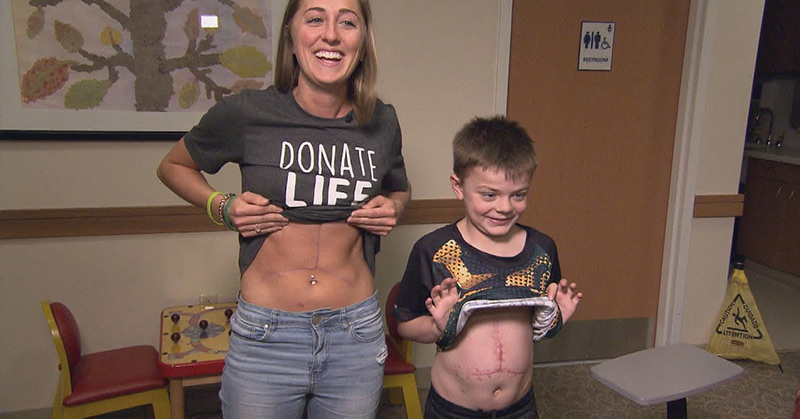The most terrifying moment for any parent is discovering that their child is gravely ill. As a parent, you strive to care for and protect your children, but when faced with circumstances beyond your control, you feel powerless and desperate.
This was exactly how Ruth and James Auten felt when they learned that their healthy, active eight-year-old son had an aggressive virus attacking his liver.
Brayden, who loved wrestling and had just finished competing in the state championship, urgently needed a liver transplant. However, finding a donor in time seemed nearly impossible.
Brayden's story reached a neighboring hospital, where ICU nurse Camie Loritz performed an extraordinary act of kindness by offering to donate part of her liver to save his life.
What Does Your Liver Do?
The liver, one of the largest organs in the body, performs many essential functions. It converts nutrients from food into usable substances, stores these substances, and supplies them to cells as needed.
Additionally, the liver absorbs toxins, converting them into harmless substances or ensuring they are expelled from the body.
The liver also produces proteins, with the assistance of vitamin K, that help your blood to clot.
What Types Of Viruses Attack the Liver?
The primary viruses that attack the liver are known as hepatitis viruses. Hepatitis, meaning "inflammation of the liver," comes in six types: A, B, C, D, E, and G, with A, B, and C being the most common. When inflamed, the liver cannot perform its functions effectively.
Liver virus symptoms are often vague and can include general nausea, vomiting, fever, loss of appetite, weakness, and fatigue. These common signs suggest that something might be wrong with your liver.
Who Is At Risk?
Workers in healthcare professions face an elevated risk due to frequent exposure to others' blood and bodily fluids.
Those employed in sewage or water treatment also encounter higher risks as they often handle various chemicals and toxins.
Others at heightened risk of contracting hepatitis include individuals with multiple sexual partners, intravenous drug users, HIV patients, and people with hemophilia who receive blood clotting factors.
Liver Transplants
A liver transplant involves a patient with a diseased liver receiving either a whole or partially healthy liver from another person.
Currently, a liver transplant remains the sole option for individuals with a diseased or failing liver, as there is no device available that can replicate all liver functions .
A liver transplant occurs when a patient with a diseased liver receives a healthy liver, either whole or partial, from another individual.
Currently, a liver transplant is the only viable option for individuals with a diseased or failing liver, as there is no device capable of performing all liver functions.
Liver transplant surgery is a major procedure lasting between six and eight hours. It involves inherent risks, and the potential benefits are carefully weighed before a patient is placed on the organ donor waiting list.
There are several reasons why someone may not qualify as a suitable candidate for a liver transplant:
If you have a severe, irreversible medical condition with short-term life expectancy
If you have severe pulmonary hypertension
If you have cancer that has spread to other parts of the body
If your infection is systemic or uncontrollable
If you are an active substance abuser (alcohol or drugs)
If you have a history of non-compliance or are unable to adhere to a strict medical regime
If you have severe and uncontrollable psychiatric disease
What Can Go Wrong During A Liver Transplant?
As mentioned above, liver transplants are major surgeries and there are some risks associated with it. They include:
Bile duct leaks or the shrinking of your bile ducts
Bleeding
Blood clots
The donated liver could fail
Infection
Your body could reject the donated liver
Mental confusion or seizures
Why Would Aa Donated Liver Fail?
Sometimes, a donated liver may fail or be rejected by the recipient's body because it is perceived as foreign. The body's natural response is to attack and potentially destroy the new organ. To ensure successful integration of the transplant, patients must adhere to a regimen of medications that deceive the immune system into accepting the new liver.
Due to their impact on the immune system, these medications increase susceptibility to infections. Physicians must carefully balance preventing organ rejection with the risk of infection.
Where Do Donated Livers Come From?
Livers for transplant are sourced either from deceased donors who have been declared brain dead, with consent from their next of kin, or from living donors such as family members or friends who can donate a portion of their liver. Donor-recipient matching considers factors like liver size and blood type, with priority given to the most critically ill patients on the waiting list.
The wait for a suitable liver can be lengthy, causing significant emotional stress for patients and their loved ones.
How Do I Keep My Liver Healthy?
Maintaining a healthy liver is crucial, even though liver disease such as Hepatitis often occurs unintentionally. Here are some tips to promote liver health:
Maintain a healthy weight
Eat a diet that contains lots of fiber, fresh fruits and vegetables, and healthy fats
Exercise regularly
Avoid contact with toxins from cleaning and aerosol products, insecticides, chemicals, and additives
Consume alcohol moderately
Avoid the use of drugs
Avoid contaminated needles (this includes in hospital settings, tattoo parlors, etc.)
Talk to your doctor if you come in contact with someone else's blood
Don't share personal hygiene items
Practice protected sex
Wash your hands
Follow directions on all medications so as not to harm your liver



